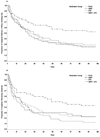A double-blind, placebo-controlled trial combining sertraline and naltrexone for treating co-occurring depression and alcohol dependence
- PMID: 20231324
- PMCID: PMC3121313
- DOI: 10.1176/appi.ajp.2009.08060852
A double-blind, placebo-controlled trial combining sertraline and naltrexone for treating co-occurring depression and alcohol dependence
Abstract
Objective: Empirical evidence has only weakly supported antidepressant treatment for patients with co-occurring depression and alcohol dependence. While some studies have demonstrated that antidepressants reduce depressive symptoms in individuals with depression and alcohol dependence, most studies have not found antidepressant treatment helpful in reducing excessive drinking in these patients. The authors provide results from a double-blind, placebo-controlled trial that evaluated the efficacy of combining approved medications for depression (sertraline) and alcohol dependence (naltrexone) in treating patients with both disorders.
Method: A total of 170 depressed alcohol-dependent patients were randomly assigned to receive 14 weeks of treatment with sertraline (200 mg/day [N=40]), naltrexone (100 mg/day [N=49]), the combination of sertraline plus naltrexone (N=42), or double placebo (N=39) while receiving weekly cognitive-behavioral therapy.
Results: The sertraline plus naltrexone combination produced a higher alcohol abstinence rate (53.7%) and demonstrated a longer delay before relapse to heavy drinking (median delay=98 days) than the naltrexone (abstinence rate: 21.3%; delay=29 days), sertraline (abstinence rate: 27.5%; delay=23 days), and placebo (abstinence rate: 23.1%; delay=26 days) groups. The number of patients in the medication combination group not depressed by the end of treatment (83.3%) approached significance when compared with patients in the other treatment groups. The serious adverse event rate was 25.9%, with fewer reported with the medication combination (11.9%) than the other treatments.
Conclusions: More depressed alcohol-dependent patients receiving the sertraline plus naltrexone combination achieved abstinence from alcohol, had delayed relapse to heavy drinking, reported fewer serious adverse events, and tended to not be depressed by the end of treatment.
Trial registration: ClinicalTrials.gov NCT00004554.
Figures



Comment in
-
Treatments for alcohol dependence: rethinking the role of comorbidity and clinical subtypes.Am J Psychiatry. 2010 Jun;167(6):620-2. doi: 10.1176/appi.ajp.2010.10030309. Am J Psychiatry. 2010. PMID: 20516159 No abstract available.
-
Combining sertraline and naltrexone in the treatment of adults with comorbid depression and alcohol dependence.Curr Psychiatry Rep. 2011 Aug;13(4):245-7. doi: 10.1007/s11920-011-0198-y. Curr Psychiatry Rep. 2011. PMID: 21468673 No abstract available.
References
-
- Hesselbrock MN, Meyer RE, Keener JJ. Psychopathology in hospitalized alcoholics. Arch Gen Psychiatry. 1985;42(11):1050–1055. - PubMed
-
- Kessler RC, Crum RM, Warner LA, Nelson CB, Schulenberg J, Anthony JC. Lifetime co-occurrence of DSM-III-R alcohol abuse and dependence with other psychiatric disorders in the National Comorbidity Survey. Arch Gen Psychiatry. 1997;54(4):313–321. - PubMed
-
- Regier DA, Farmer ME, Rae DS, Locke BZ, Keith SJ, Judd LL, Goodwin FK. Comorbidity of mental disorders with alcohol and other drug abuse. Results from the Epidemiologic Catchment Area (ECA) Study. JAMA. 1990;264(19):2511–2518. - PubMed
-
- Gilman SE, Abraham HD. A longitudinal study of the order of onset of alcohol dependence and major depression. Drug Alcohol Depend. 2001;63(3):277–286. - PubMed
-
- Grant BF, Harford TC. Comorbidity between DSM-IV alcohol use disorders and major depression: Results of a national survey. Drug Alcohol Depend. 1995;39(3):197–206. - PubMed
Publication types
MeSH terms
Substances
Associated data
Grants and funding
LinkOut - more resources
Full Text Sources
Other Literature Sources
Medical

